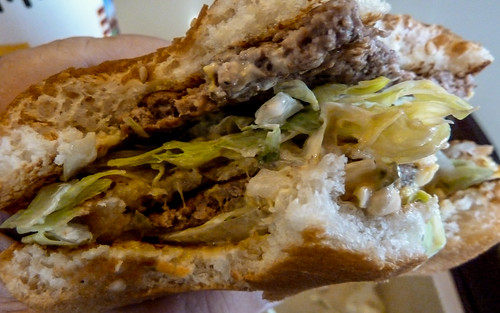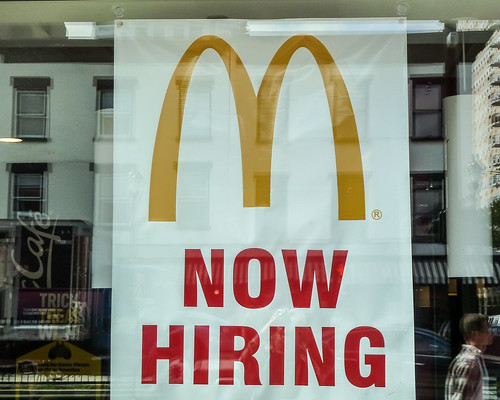It’s that time of year, time to update my ongoing critique of the MacArthur Fellows Program, The Genius Chronicles: Going Boldly Where None Have Gone Before? I’ve been writing about this public relations campaign – for that’s what it is (see The Genius Chronicles, Version 6, p. 12, links below) – since 2013. I was motivated by a simple observation:
The majority of the Fellows have tenured positions at elite universities.
As those are the kind of people who ordinary get prestigious fellowships and awards there’s nothing surprising about that.
Forget about the academy
Except, except...that’s not what the program was created to do. It was created to help exceptionally original individuals who, by virtue of that originality, have been overlooked by the standard institutions and so are likely to be in need of financial help because of that. Well, if you’ve got tenure at Harvard, Chicago, or Cal Tech, you’ve got a steady income and lifetime employment. Your academic environment may not be ideal, but you’re not starving, you’re not waiting tables, or filing insurance claims, or driving a cab. You can function.
I had a simple idea for making a marginal improvement to the program, one that nudges it closer to the original intent: Don’t give ANY awards to people with tenure at good schools. Easy peasy, simple as pie. But of course, the foundation didn’t take my advice – and, to tell the truth, I didn’t make any focused attempt to reach them. I just posted may arguments on the web where anyone can read them. I figure that if the foundation had the least inclination in that direction, they’d have found those documents. After all, I’ve been posting one each year since 2013. And if they’re not actively scouring the web...that question answers itself.
Each year I update the numbers when a new class of fellows is announced. From 2013 to now, 2018, they’ve given out 141 fellowships. Of those 77 have gone to people with tenure (or on a tenure track) at elite institutions. That’s 55% of the fellowships, a majority, not a large majority (and it was only 50-50 last year), but still, a majority.
If they had taken my advice, starting in 2014, how would things be different today? It’s hard to tell. For one thing, what differences should we be looking for?
Changing times
But I’ve got some thoughts. First, as I’ve already indicated, a MacArthur Fellowship could make a dramatic difference in the life of someone who has to work a wearisome day job while pursuing their creative work in the evenings and on weekends, if they can do so at all. Even if the day job isn’t so bad – yeah, I know about, e.g. Charles Ives, insurance executive – you work better if you’ve got long uninterrupted blocks of time you can devote to creative work. On the other hand, a Big Mac fellowship is not going to make much difference to someone who’s got tenure at, say, Princeton or Stanford. Maybe they can get a new instrument or two for the lab, convert the attic into a nice library, or get on the waiting list for a Tesla, fund a postdoc, things on that order. Good things all, but not life changing.
At the level of the well-being of a handful of individuals, yes, that one simple change would make a difference. Elite insiders are not much harmed by the change while the lives of outsiders are much improved. But, however important it may be, the well-being of a few individuals is not the point of the program. The goal is to increase the returns to society on the foundation’s investment in the lives of its fellows.
On that I can do no more than speculate. I know, of course, that finding extremely creative people is inherently difficult – something I discuss in “The Big Sort” in the Chronicles, pp. 18-24. It’s not simply that finding them is difficult, but how do you tell the difference between a crank and someone who really is deeply creative? Surely one reason the foundation devotes so much effort to elite academia is that those institutions have already done a great deal of sorting and choosing. The cranks have been weeded out. But then, the geniuses may be gone as well – yes, I know the foundation frowns on that word, ”genius”. Behind closed doors, though, don’t they love it?
And there’s the rub. If you’re looking for people like Pāṇini, Sappho, Cervantes, Florence Nightingale, Sequoia, Murasaki Shikibu, Goethe, and Thelonius Monk, you aren’t just looking for ability. You’re looking for the fit between ability and cultural need. That’s much harder to judge.
As we all know, the times they are a changin’. Massively, rapidly, unpredictably. And those elite colleges and universities are grounded in 19th century institutional structures. It’s not simply that they are inherently conservative, but that what they are conserving is rooted in a world that’s becoming obsolete at an accelerating pace. As I note at the end of “Cultural Factors” (the Chronicles, p. 26):
Remember, when the dinosaurs ruled the earth mammals were pitiful little creatures who had to live off their leavings. Sixty-five million years ago an asteroid struck the earth, changing living conditions worldwide. The dinosaurs died out and the mammals came to thrive.Is the current regime of world-wide cultural ferment the social analog to that asteroid of old?
The effort the foundation devotes to choosing tenured academics is basically effort devoted to picking the best dinosaurs. They may be a few mammals here at there, but not many. If they want mammals, they’re better off looking outside the universities. Finding good ones will be difficult, but at least they’re there.
Set an example
The MacArthur Fellows program is the most visible program the foundation has, though it’s a relatively small one. For that matter, it may be the single most visible philanthropic program in the country, if not the world. What other philanthropic program has, for example, all but reserved annual slots in major news media? If the foundation changes this flagship program, everyone will see it.
One can certainly argue that, in the early days when the foundation had no track record, it had no choice but to make its awards to “safe” choices, choices that would be approved in the world of elite philanthropic institutions. In that way it would itself become recognized as a fully legitimate institution. But the MacArthur Foundation has long since passed through this legitimation phase. It is now a well established and highly respected foundation.
It is now a source of legitimacy. It has its own cultural capital. Why not expend it on something that is in fact innovative? Why not set an example? And if others were to follow that example...who knows? (See the Chronicle, pp. 11-13, 14-16, 38 ff.)
Starting with the original suite of posts in 2013 I have been accumulating those posts into a working paper:
The Genius Chronicles: Going Boldly Where None Have Gone Before? Version 6, Working Paper, October 2018, 61 pp.
Academica.edu: https://www.academia.edu/7974651/The_Genius_Chronicles_Going_Boldly_Where_None_Have_Gone_Before.
Scribd: https://www.scribd.com/document/390256254/The-Genius-Chronicles-Going-Boldly-Where-None-Have-Gone-Before.
Waffle Tallies
Here’s the Big Mac “waffle” tally (percentage of awards to people with secure gigs) for the last six years, including 2018:
2013: 63%
2014: 52%
2015: 54%
2016: 57%
2017: 50%
2018: 52%
The 2018 tally cuts it close: 13 at secure university gigs, 12 at other gigs. Note, however, that two of those other gigs are a tenure-track university posts No guarantees there, unlike the tenured jobs, but they’re pretty safe. There are no starving artists in this crowd.
Current Class
I’ve divided them into four groups:
Secure university posts: 11Here’s what those categories mean:
Pre-tenure university: 2
Other-employed: 7
Self-employed: 5
Secure University Positions: These people have the rank of Associate Professor or above. As that rank normally carries tenure I assume these people have lifetime employment. They DO NOT need this award in order to put a roof over their head, or food on the table. For various reasons, above and beyond the mere fact that life is tough, these people may not be happy with their secure jobs. But that’s a different matter.Tenure-track University Positions: These are assistant professors, which is normally pre-tenure. I am assuming that they are in salary lines intended for tenure, but tenure is not guaranteed.Other-Employed: These people work for someone else, but not a university. In a number of cases they’re working at organizations they’ve founded.Self-Employed: Just what it says. There people are on their own, though most of them have some substantial recognition along with high-class track records.
Secure University Jobs – 11
| ||
Clifford Brangwynne, 40
|
Biophysical engineer
|
Princeton University, Princeton, N.J.
|
Natalie Diaz, 40
|
Poet
|
Arizona State University
|
Deborah Estrin, 58
|
Computer scientist
|
Cornell Tech, New York
|
Amy Finkelstein,44
|
Health economist
|
Massachusetts Institute of Technology, Cambridge, Mass.
|
John Keene, 53
|
Writer
|
Rutgers University-Newark, Newark
|
Kristina Olson, 37
|
Psychologist
|
University of Washington, Seattle
|
Lisa Parks,51
|
Media scholar
|
Massachusetts Institute of Technology, Cambridge, Mass.
|
Rebecca Sandefur, 47
|
Sociologist and legal scholar
|
University of Illinois-Urbana Champaign, Urbana, Ill.
|
Allan Sly, 36
|
Mathematician
|
Princeton University, Princeton, N.J.
|
Sarah T. Stewart, 45
|
Planetary scientist
|
University of California-Davis, Davis, Calif.
|
Doris Tsao, 42
|
Neuroscientist
|
California Institute of Technology, Pasadena, Calif.
|
Pre-tenure University Jobs - 2
| ||
Livia S. Eberlin, 32
|
Analytical chemist
|
University of Texas-Austin, Austin, Texas
|
Gregg Gonsalves, 54
|
Epidemiologist
|
Yale University,New Haven, Conn.
|
Other Employed - 7
| ||
Matthew Aucoin, 28
|
Composer and conductor
|
American Modern Opera Company/Los Angeles Opera, New York
|
Rev. William J. Barber II, 55
|
Pastor and civil rights activist
|
Goldsboro, N.C.
|
Vijay Gupta, 31
|
Violinist and speaker
|
Los Angeles Philharmonic, Los Angeles
|
Becca Heller, 36
|
Human rights lawyer
|
International Refugee Assistance Project, New York
|
Raj Jayadev, 43
|
Community organizer
|
Silicon Valley De-Bug, San Jose, Calif.
|
Dominique Morisseau,40
|
Playwright
|
Signature Theater, New York
|
Ken Ward Jr., 50
|
Journalist
|
The Charleston Gazette-Mail, Charleston, W.Va.
|
Self-Employed - 5
| ||
Wu Tsang, 36
|
Filmmaker and performance artist
|
New York
|
Julie Ault, 60
|
Artist and curator
|
New York
|
Titus Kaphar, 42
|
Painter
|
NXTHVN, New Haven, Conn.
|
Kelly Link,49
|
Writer
|
Northampton, Mass.
|
Okwui Okpokwasili, 46
|
Choreographer and performer
|
New York
|
Didn’t get a MacArthur Fellowship? You could apply for a job a MacDonald’s. They have Big Macs too. And I hear they’re hiring.



No comments:
Post a Comment